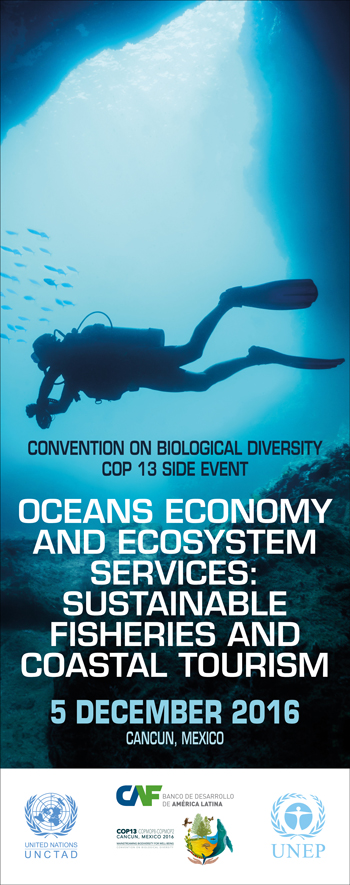On the side-lines of CBD COP 13, UNCTAD, UNEP and CAF held a side event on 5 December, entitled Oceans Economy and Ecosystem Services: Fisheries and Coastal Tourism.
This event was an opportunity for participants to raise awareness and to discuss novel international and regional approaches to address harmful incentives to marine biodiversity and ecosystem conservation and maximize the use of beneficial ones in key sustainable oceans economic sector such as fisheries and tourism, and their interlinkages under an ecosystem approach, for the advancement of SDG14 and Aichi targets.
On this occasion, UNCTAD also took the opportunity to present the Trade and Environment Review 2016, which addresses trade in fish, to the environment-related community in attendence.
During discussions, Mr. Rene Gomez, CAF, highlighted that SDGs have been for the first time included a goal exclusively dedicated to oceans and seas conservation (SDG 14). This focuses the attention of the international community on how to better manage and sustainably use marine resources and ecosystems.
The size of the oceans economy is estimated by UNCTAD and UNEP as between USD 1 to 1.5 trillion a year. It is mainly composed by key sectors such as sustainable fisheries, transport, tourism, aquaculture, marine research and off shore tidal and wind energy. Further estimates suggest that oceans economic sectors will double in size by 2030, creating opportunities for both new economic activities and employment.
Over the years we have learned several lessons, said Mr. Balakhrisna Pisupati, UNEP:
First, the blue economy is rapidly innovating and diversifying;
Second, the blue economy initiatives require broad and resilient partnerships to tackle challenges and size opportunities imposed by: increasing of the population and income, which impacts natural resources and has clear indicators showing the resources are decreasing, in addition to climate change;
Third, there is a need for a strong knowledge base, as well as coordination to act collectively with a mind set on the impacts on the resources instead of how many dollars one can get.
Mr. Lucas Assuncao, UNCTAD, stressed that UNCTAD, CAF and UNEP were coming together to discuss important and pressing issue for the years to come. He pointed out that the coming year will be important in consolidating political actions to implement SDG 14, as the UN Oceans Conference and the WTO Ministerial Conference will be held in June and December 2017, respectively.
These two conferences will define the next steps in the process and how we regulate both harmful and positive incentives in line with SDG 14.
Mr. Federico Vignati, CAF, reinforced the importance of the strategic alliance with UNCTAD in order to take opportunities and share prosperity through enhancing private investment to spill over the effects of conservation and sustainable use of resources.
In this regard, there is a need to define multilateral rules that prohibit certain forms of fish subsidies that contribute to overfishing, over capacity and IUU fishing in light of the UNCTAD/FAO/UNEP Statement on fish subsidies made at the UNCTAD 14 Conference in Nairobi in July 2016.
Mr. Vivas-Eugui, UNCTAD, went even further by saying that subsidies to harvest an already depleted resource do not make any economic, environmental or social sense. It is time to act.
Marine Protected Areas (MPAs) can play a positive role in promoting tourism, pointed out Ms. Katia Karousakis, OECD. She stated that MPAs have shown to protect from overfishing and habitat degradation and that they can provide benefits beyond ecological ones e.g. sustainable tourism. In this sense, they attract tourists, generate revenue and can support local communities. MPAs in Sweden, Tanzania, USA and Vietnam offer some good examples. However, Ms. Karousakis noted that more than MPAs is required to deal with key pressures: effective policy mixes including the reform of harmful subsidies are needed.
According to Ms. Tundy Agardy, Mares Trend, the development of incentives for private investment in sustainable fisheries and coastal tourism are critical. These would reduce risks and vulnerabilities, enhance sustainable production, increase value addition, decrease level of natural inputs and regulate resource use. The integrative approach is important as well as to consider values that are not only monetary. How to communicate this to decision-makers is a key issue to enhance investment in needed restoration actions.
The organisers concluded jointly with about 30 participants that conservation and sustainable use of marine resources and ecosystems must go hand in hand with a well designed policy mix under oceans economy and trade strategies that supports a new bluer development path. This is a message that needs to be taken at the core of the CBD COP 13.



